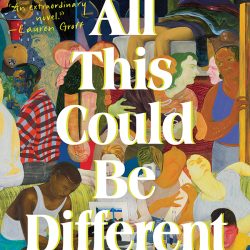Words, Wit, & Wild Hearts
A Conversation with Author Lorrie Moore
Lorrie Moore, professor of creative writing at UW-Madison, is one of the premier authors of her generation, called variously “the maestro” and “the most irresistible” writer now practicing the art of fiction. Almost as though her life were a screenplay about being a successful writer, Moore, at nineteen, won Seventeen Magazine’s fiction contest, and then, after she completed MFA studies as a protégé of Alison Lurie, her first book of short stories, Self-Help, was published by Knopf in 1985, when Moore was just twenty-six.
In 1984, with a newly earned MFA from Cornell, Moore began teaching fiction at UW-Madison, although she commuted between New York and Madison for several years. She won the 1998 O. Henry Award for her short story “People Like That Are the Only People Here,” published in The New Yorker in 1997. In 2004, Moore was selected to receive the Rea Award for the Short Story, for outstanding achievement in that genre. In 2006, she was elected to the American Academy of Arts and Letters. Now a full-time Madison resident, she also is the divorced mom of a teenage son.
While Moore’s privacy is delicate, as a friend and a kindly fellow human being, she recently sat down with me to talk about books, publishing, and A Gate at the Stairs, her most recent novel — also her first book in eleven years and her first novel in fifteen. It tells the story of one year in the life of twenty-year-old Tassie Keltjin, a potato farmer’s daughter attending college in a fictional Madison immediately post-9/11, who is a nanny for the mixed-race toddler adopted by her beleaguered and eccentric employer, Sarah Brink. Besides being a coming-of-age story, the book is heartbreaking, rum, tragic, witty, and trenchant social commentary: the protagonist loses her virginity to a feckless lad who may or may not be a jihadist and then loses her only brother to the war in Afghanistan. A Gate at the Stairs also was a New York Times bestseller, and of it, notoriously choleric New York Times reviewer Michiko Kakutani wrote, “In this haunting novel, Ms. Moore gives us stark, melancholy glimpses into her characters’ hearts.”
Characteristically diffident, Moore, a native of New York state, plays down the novel’s enormous success while acknowledging that its “nightmare story” moved her to tears as she wrote. While the book owes some of its inspiration (and its final wry line) to the “governess” tradition of Jane Eyre, it is Moore at her crisp twenty-first-century finest, remembering all of us — for all of us — with characteristic and sardonic charm.
Besides A Gate at the Stairs, Moore’s oeuvre comprises four collections of short stories: Self-Help (1985), Like Life (1990), Birds of America (1998), and The Collected Stories (2008); and two novels, Anagrams (1986) and Who Will Run the Frog Hospital? (1994). Anagrams was optioned for a film by … Madonna.
[Mitchard] This is fiction, but what about the choice to create a twenty-year-old virgin?
[Moore] Oh, so it’s going to be that kind of interview! Interesting. You think twenty-year-olds would not be virgins the way the twenty-year-olds are in Jane Eyre and Turn of the Screw, the governess novels most on my mind here? I can easily imagine a twenty-year-old virgin. But the book’s job, I guess, is to get you to imagine it, too. A lot of readers do a kind of reality-testing of fiction against their own experience and have quibbled with many aspects of this book (as in, “She would never listen to the band Modest Mouse!”), but you’re the first to use the phrase “create a twenty-year-old virgin” as if I’d done it freakishly in a lab. I think many twenty-year-olds have proceeded slowly and uninspired through their teens. Am I wrong? It never occurred to me that this might be statistically unusual. Do you have the stats?
Do you play the bass guitar? Tassie loves it. What makes you crazy about the bass guitar?
I don’t play the bass. My niece does, though — or used to. I did borrow a version of her e-mail address. But mostly I had to make this all up and ask people — including Nick Moran, the terrific bass player here in Madison whom I quizzed one day when he was waiting lunch tables at his mom’s restaurant; he allowed me to take notes. He also said he had always wanted my niece’s e-mail address for his own, but it had been taken. I suppose here I should say, if you want to know what the mail address is, you’ll have to read the book …
Some quite horrific things in the book are handled in a darkly comic way — the horrible incident with the four-year-old at the highway picnic area, the shooting of the black teen by police called to his house with an alarm system installed to protect him by his adoptive parents. Some critics say, ‘Hey, girl, it’s just not funny.’ What do you say?
I would agree. Those parts aren’t funny. At least they’re not supposed to be. I never thought of this book as being very funny. And the parts you mention are horrifying to me, and so as part of the horror show that is the novel — its tragic and politically gothic components — I felt they needed to be there. I do have stories where I think horrifying events are handled with dark humor, but I don’t think this new novel does that.
A person doesn’t write directly about her kid, her life, her politics — that is, in fiction. Except we do. I do … albeit in a less confessional way, maybe, some more than others. When you write about a woman with a little mixed kid in a stroller, are you writing about you? Do your feelings about raising your own particular child inform this book? Are you examining questions you asked yourself as a young mom, or yearning to be that young mom or relive that experience?
No, nothing’s me, but as you know, we get interested in certain things because of our lives and then travel with these things in a different direction. Such is storytelling.
This book has been a major, major bestseller for three months. Are literary fiction writers allowed to do this? Are you going to have the scarlet Lripped off your black sweater?
Darling Jackie, it was not a major, major bestseller for three months. It was a minor, minor one for three weeks. So the L stays on the sweater.
Was that part, the bestseller-ness, thrilling or vindicating or just plain nice and lucrative in some sense? Is a big-screen movie next? A soundtrack?
I love this experience you’re inventing here, and I’m trying to have it along with you. In reality, however, it doesn’t have any of the ingredients you suggest. The novel has had much the same trajectory as my last book, which was a collection of stories. The story collection got better reviews because people feel more sorry for you, but in general, the commercial narrative is the same. No movie, no soundtrack, and I’ll share the sobering sales numbers with you when you turn off the tape.
You once told me it was fun to own a house — that it was like playing house, playing being grown. How do you see that world of domestic dominion, a man and a woman and a house, at fifty?
Well, I am fifty-two and missing one of the ingredients you mention. Did I really say it was like playing house? Was I taking Claritin-D at the time? Perhaps I felt the fun-ness of it at the beginning. My first house was a sturdier house. The next house I moved to, which is where I still am, is a falling-apart house and requires emergency buttressing weekly to keep it from crashing down. There are squirrels in the chimney, raccoons in the walls, and bats throughout. The wiring blinks the lights on and off, as in Gaslight. It never had a proper owner — that is, someone who could really pour money into it. Oh, well. I’m avoiding your “domestic dominion” question because I’m not sure exactly what it means, though the alliteration is nice.
You’re shy. What’s that like, going out to flack a book? Has this tour been more intensive and exhausting than it should have been?
Yes. Luckily I’m on heart medication, so I can clutch the lectern and remain vertical. Mostly audiences have been very nice, though I’ve had my share of glowerers.
Would you like more of your books to reach this wider audience that has embraced A Gate at the Stairs,or is that not the point?
Yeah, I don’t think that’s the point. This book is not for everyone. No book is for everyone. The wider the audience you reach, the more disgruntled readers you create, so I don’t know. Writers do have to eat, however. But you are also trying to make literary art, which has a limited number of consumers. You can grow that number only up to a point, I’m afraid.
We’re of a generation, you and I (sounds like Kipling). In our adulthood generation, the “where were you when …” experience is 9/11. Of course, that’s not unique to our age group, just as the “where were you when President Kennedy was shot?” was not unique to our parents or our older brothers and sisters. Tassie Keltjin lives directly post-9/11, but seems unfazed by it and even has a maybe-Islamic-terrorist lover. Why?
I was interested in the “chickens have come home to roost” response to 9/11, and the very few Islamic studies courses here at the UW did fill up quickly after 9/11. I think students were tremendously curious about the world that had suddenly landed here — or that, in reality, had been here all along. This was the response of non-Muslim students. Muslim students have had their own great diversity of response. One can be interested in understanding jihadism without being a jihadist. Susan Sontag wrote admiringly of the bravery of the 9/11 terrorists [in The New Yorker], which prompted much outcry. Understanding terrorism while also condemning it is an intellectual space that many people have entered. Perhaps young people, in their searching-ness, can get there more easily. I think that Tassie Keltjin is one of those, somewhat. The young man she falls for has lost his job due to the racial profiling on bridge and tunnel traffic after 9/11.
Which brings me to another question. If we write in the Common Era, as it were, are fiction writers obliged to give a nod to 9/11, as Bugs Bunny constantly referred back to World War II? (I regret the unfortunate example, but Warner Brothers cartoons were significant in my cultural anthropology.)
Hmmm …
Is Tassie in any sense a sendup? She seems so made from contradictions — only twenty, yet referring to music and movies not just of her parents’ generation, but back beyond that. Is she a Renaissance girl? She’s never been on an airplane, yet she has parents who honeymooned in England. What’s with her?
Tassie is not a sendup and is meant to be experienced on a realistic and intimate level. Her cultural references are a hodgepodge, the way I imagined a musician’s would be, the granddaughter of academics would be, a bright but isolated girl growing up in the countryside would be. I don’t think a writer’s obliged to nod in any direction that the book doesn’t want to go.
Some years ago, you told me you were late with the deadline on a pastoral novel. In what sense is A Gate at the Stairsa pastoral?
Well parts of it, I suppose, are. But Tassie’s family in the country is viewed as a kind of ersatz farm family, and so the pastoral elements are engaged with almost touristically — until the end, I think, when Tassie is returned to the country and reconnects with her dad there in a new and appreciating way.
Coming of age is a recurring motif for you. What so captivates you about the threshold of adult life?
It’s not a motif at all in my [short] stories. I don’t think there’s a single story that takes it on. But it is at the heart of two of my novels. Coming of age, of course, requires more time and space to depict. And I guess when I think of a long story, young women leaving their homes behind come to mind. The passage of time and looking back on youth from even a slight distance seems better for the larger canvas of a novel.
[Tassie’s employer] Sarah is such a jerk — to me, anyway! She is such a Madison-Woman-of-a-Certain-Kind, but on steroids. She doesn’t want the little girl. She wants her husband and some morels with a mustard-and-thyme reduction sauce. Tassie may be aimless, but her heart is pure. How can she stomach Sarah and the Wednesday evenings? How can she hold on emotionally after Sarah’s dark revelation?
Oh, I don’t think Sarah’s so terrible. I keep imagining her being played nervously and wearily and comedically by Judy Davis. I see her as full of good intentions and living on the road to hell that is paved with them. But everyone’s entitled to her own opinion. Someone in Santa Cruz stood up at a reading and told me the same thing, that she didn’t like Sarah. And I said, “That’s okay.” A reader doesn’t have to. Sarah’s a mixed bag, and readers can have whatever response they want.
People do the strangest things for love. They revoke their dreams. They see the “other person’s” point of view. The “other person” is always a guy and the revoker is always a woman. This is a thread throughout A Gate at the Stairs. Is it a vexing part of the human condition?
I try never to pronounce on the human condition. I do think in this book that women accommodate themselves to men a little more than is ideal — but in a way that is not necessarily untrue to life. As we know, there’s a great variety to couples. Which is why they make for good stories.
You don’t sound like a very proficient housecleaner. Do you have help, now that you’re on the bestseller list?
It’s been eleven years between books. I don’t have any extra money. Plus, I try never to discuss housecleaning.
I loved the potato parts of this book. I don’t know why. Potatoes are so inscrutable, although they have eyes. Did you choose them because they take so much from the earth?
They have eyes, thin skin, and snappable roots. These are features of most of the novel’s characters. Plus, they are a genuine Wisconsin crop. I know Idaho gets all the fame, but Wisconsin grows a lot of them.
My favorite exchange in the book was the social observation at the playground — in which Tassie rejects a mom’s self-seeking wish to give her daughter Mary-Emma as an “African-American friend.” I think that it’s possible that ordinarily constructed families sometimes see families in which there is something different (adoption, mixed race) as fair game, as fuel for either self-righteousness or consciousness-raising. As a mom of some children who were adopted and some who weren’t, that makes me crazy. Were you driven by those kinds of encounters in writing this book?
The book was primarily an update of the governess novel. But I was inspired to include various things I knew or heard about regarding trans-racial parenting.
Tassie doesn’t believe in true love. Does Lorrie Moore? If so, what kind? For a friend, a man, an English garden, a breed of cat?
Tassie is trying to make her way toward an idea of useful love rather than one that is mere dream or fun intoxication. I personally don’t see love as something you believe in. I don’t think you get to choose. It happens to you and events ensue.
When you depart from short stories, a form in which you are an acknowledged maestro, it seems to bug people. Do you think this?
A lot of things bug a lot of people, and I’m lucky not to be privy to it all, since, as I mentioned before, I have a heart condition. I try not to pay attention to the ways in which my fiction might irritate people, since — good grief — it is only fiction. Besides, it’s a cliché of small communities that they bash their writers, and I’d rather think of this community as a larger one than that.
Do reviews in which your novel is called “utterly necessary” confuse you as much as those in which the critic complains about too many similes? Is fiction ever utterly necessary? Can there be too many good similes, even on a given page?
I don’t think I saw the “utterly necessary” ones. That “utterly” is a strange word — don’t you think? It suggests degrees of necessariness. And then we are really off on another subject entirely. Can there be too many similes? Of course. With A Gate at the Stairs, Tassie is a bit of a lyricist and is in constant searching mode — sometimes even caught in verbal rhapsodies of emotions like disgust. I gave her free reign to have extra language when it suited, as it would be appropriate for her character.
I once admired Jill McCorkle for beginning a talk by saying, “Ladies and gentlemen, I now hate this book.” She said that because she’d plowed the same ground over and over, and in some places, simply could notreproduce the tune she heard in her head and she wanted to put it behind her. Do you ever feel that way about completed work? Or do you cherish it?
Well, when you go on a book tour, there comes a point where you do turn against the book. It’s the part the publisher shouldn’t learn about. It took me a while to get over keeping company with Tassie Keltjin — I did miss her for a while, but I’m over it. I’m eager to move on to the next thing.
Are you a natural, sure and swift, or a Very. Deliberate. Writer.?
I’m haphazard, ad hoc, and intermittent. Also I require coffee. In short? I’m slow, but there are bursts.
If you could write another kind of novel, what would that kind be? If you could be another kind of artist, what would you be?
I would be the intrepid sort of novelist who goes all over and writes from war zones — like Bill Vollmann, but without the prostitutes. Or at least with fewer prostitutes. I would also love to write a thriller or a detective novel. Wouldn’t you?
Do negative reviews hurt you? Do you read them? Do glowing reviews send you dancing down the street like Gene Kelly in Singin’ in the Rain? Do you read them?
This is really a housekeeping question! Negative reviews written by other writers are good for keeping house, since you get to take that writer’s books out of your shelves and toss them, making more room for other books that are just lying around in piles.
When you teach, and I know you do love to teach, what do you tell your students over and over? Do you see yourself teaching always — that is, for the rest of your life until you’re buggy?
I will die with chalk in my hands.
Why do we teach writing in the first place?
If you teach to undergraduates, you are just part of their college education, and you are teaching them composition and literature and what is psychologically and linguistically true and what is manufactured and shortchanging of the life of the mind. At the graduate level, one teaches the same things, really, but there are also discussions about agents.
Last one: You spoke once in an interview of feeling a sort of “Oh, dear …” emotion while reading the proofs of stories written in your twenties. It’s nearly thirty years later now. What do you know that you didn’t know … and I don’t mean only about writing prose.
I’m not sure that one is wiser as one gets older. I don’t really buy that. But one is better read, even if one has forgotten half of what one has read. So one can look at early work and think I would never choose to write a story about that now, et cetera. One’s interests change. Also having only a typewriter back then made revision much more difficult. That you would just have to let a page go because you couldn’t bear to retype it was a common condition back then that no one has to endure now.
Jacquelyn Mitchard is a journalist and author, most recently of No Time to Wave Goodbye (a continuation of her first novel, The Deep End of the Ocean). She teaches seminars at the free writers’ residence she founded in 2007, One Writers Place, and lives with her husband and nine children on a farm near Madison. Mitchard was a member of the UW’s public affairs staff from 1989 to 1997.
Published in the Spring 2010 issue




Comments
Diane May 26, 2010
I love Lorrie Moore, and here she proves herself to be as witty an interviewee as she is a writer. But for anyone who hasn’t read the book, there can be little impetus to now do so, seeing as the intro completely gives away a couple of its major twists. This seems like bad form (and makes me glad I’ve already read it).
jennifer welch December 30, 2010
Reading Lorrie Moore brings happiness to the fortunate reader. Only a brilliant writer could describe why, succinctly. Happiness and satisfaction can be so elusive, so I’m grateful to her for creating products that I can turn to to feel a spectrum of emotions, including elation and great admiration. Nobody else in the world could write so beautifully about crawling into a casket containing a decomposed body of a loved one. I’m serious!!